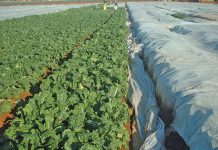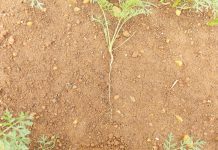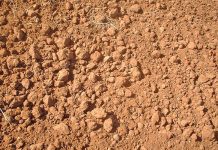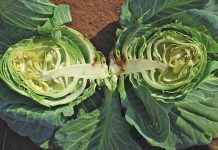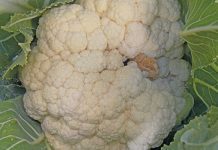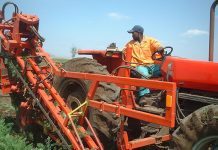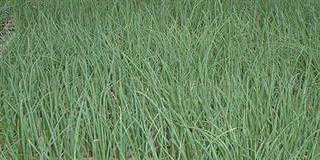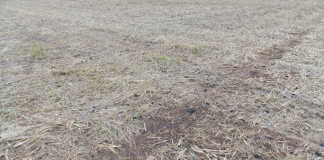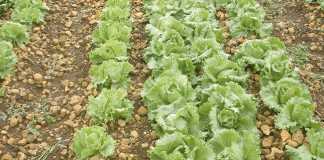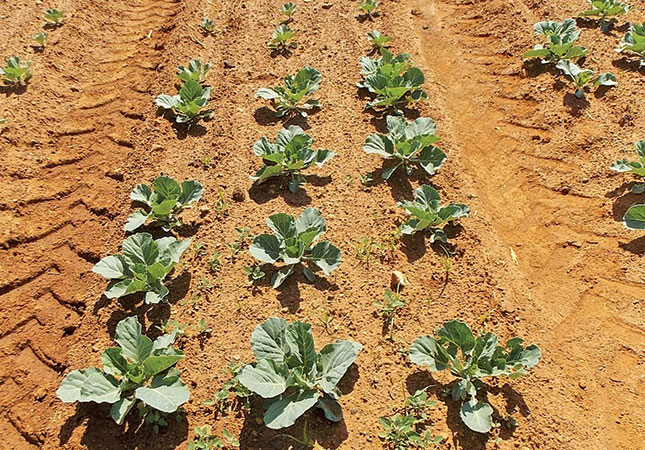
Photo: Bill Kerr
Various herbicides are available – choose one that targets the specific weeds on your land, and make sure you apply the correct dose.
The aim is to achieve adequate weed control without harming the crop, so be careful not to overdose.
READ Food labels can con and confuse consumers
The more species of weed you are trying to control, the greater the chance that you will suppress the cabbage if you exceed the recommended dose.
The influence of soil
The nature of the soil can increase or reduce the risk of harming the crop. Crops in sandy soil are more likely to be damaged, while the higher the organic content, the less the crop will be affected by higher doses.
I saw this when I extended a land by ploughing out a section of veld alongside. The veld soil was browner, due to its higher organic content, than the reddish-brown soil in the land. The entire land – old and new areas – was treated as one and the herbicide applied uniformly.
READ How to fertilise a crop correctly
The result was that in the old section, the weeds were brought completely under control, but in the new area, some remained.
The yield was also higher in this section, as there was less suppressing influence on the crop due to the higher organic matter. The latter increases crop yield regardless of herbicide use.
Remember, though, most herbicides will have some effect on growth, perhaps only initially. This is something that you have to live with, unless you choose to farm without herbicides at all – a very difficult job.
Different lands, even with the same soil type, may require different herbicide application rates due to soil condition. The poorer the soil, the more likely crop suppression.
The effect of low temperature
The temperature should also be taken into consideration. Herbicides commonly used on cabbages are more likely to suppress the crop in cold conditions. I have often seen this happen.
For example, a farmer plants on a weekly basis and uses a well-calibrated sprayer, but a particular planting takes longer to start vigorous growth. At first he cannot understand why.
Then he realises (or it is pointed out to him) that a cold snap occurred soon after setting the plants. Few farmers make this connection, however.
It is essential to calibrate correctly so that you know exactly how much herbicide to apply per hectare. At the same time, pay close attention to areas where there might have been a slight overlap, or that have been missed.
Compare these to the rest of the land to detect suppression and monitor the weeds that may have emerged.
Adjusting the water
Even the volume of water used to spray the land can affect the efficacy of herbicide. Farmers tend to use about 200l/ha when spraying.
This is fine for soil with a fine seedbed, but if there are clods in the soil, which can be beneficial for the crop, you should double the amount of water used for the same amount of active ingredient per hectare.
READ Water availability: crucial to profitable livestock production
Check that the spray pattern is uniform and the boom is at the correct height. Use tapered nozzles to ensure that there is about a one-third spray overlap between nozzles.
Two effective herbicides
The two most popular herbicides are alachlor and metolachlor. Both are excellent grass killers and eliminate most broadleaved weeds as well.
Alachlor is the safer product, but it is not as effective as metolachlor, which controls a wider spectrum of weeds. As a result, you have to be very careful not to overdose with the latter.
You will usually see some suppression of plants, but if metolachlor has been properly applied, the cabbages catch up later. If the suppression has been too great, however, they will never catch up.
The bottom line is to be accurate and observant.

